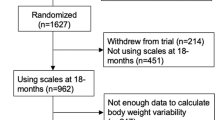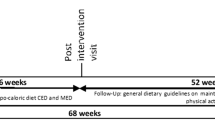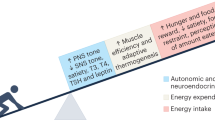Abstract
OBJECTIVE: To evaluate whether individuals who lost weight on their own (b=447), through organized programs (b=313) or with liquid formula (b=133) would differ in the strategies they used to maintain their weight losses.
DESIGN: All subjects were members of the National Weight Control Registry, had lost ≥13.6 kg (30 pounds), and kept it off at least one year (mean weight loss=30.1±14.9 kg and mean duration of maintenance=5.7±6.9 y).
RESULTS: Liquid Formula users differed from the other two groups on many characteristics; they were more likely to be women, older, heavier, and to have had a medical disorder prior to weight loss. To maintain their weight loss, the Liquid Formula group reported greater use of dietary strategies (for example, counting calories, limiting the amount of calories from fat) and higher dietary restraint. Liquid Formula users reported that weight maintenance was more difficult than losing weight, whereas individuals who lost weight on their own reported the reverse. The On Own group reported expending a higher percentage of calories through strenuous activities such as running and weight lifting, and reported weighing themselves more frequently to maintain weight loss. Despite these behavioral differences, all three groups are maintaining their weight losses similarly by eating a low calorie diet (5792.3 kJ/d and 25% of daily calories from fat) and engaging in high levels of physical activity (11847.3 kJ/week).
CONCLUSIONS: Despite using different methods to lose weight, individuals who lost weight on their own, through an organized program, or with a liquid formula, use similar behavioral strategies to maintain their weight loss.
This is a preview of subscription content, access via your institution
Access options
Subscribe to this journal
Receive 12 print issues and online access
$259.00 per year
only $21.58 per issue
Buy this article
- Purchase on Springer Link
- Instant access to full article PDF
Prices may be subject to local taxes which are calculated during checkout
Similar content being viewed by others
Author information
Authors and Affiliations
Rights and permissions
About this article
Cite this article
McGuire, M., Wing, R., Klem, M. et al. Long-term maintenance of weight loss: do people who lose weight through various weight loss methods use different behaviors to maintain their weight?. Int J Obes 22, 572–577 (1998). https://doi.org/10.1038/sj.ijo.0800627
Received:
Revised:
Accepted:
Published:
Issue Date:
DOI: https://doi.org/10.1038/sj.ijo.0800627
Keywords
This article is cited by
-
Do sex differences in reported weight loss intentions and behaviours persist across demographic characteristics and weight status in youth? A systematic review
BMC Public Health (2018)
-
Robotic gastric bypass may lead to fewer complications compared with laparoscopy
Surgical Endoscopy (2018)
-
Effects of nutrition education on weight gain prevention: a randomized controlled trial
Nutrition Journal (2015)
-
Adaptive thermogenesis can make a difference in the ability of obese individuals to lose body weight
International Journal of Obesity (2013)
-
Cluster Analysis of the National Weight Control Registry to Identify Distinct Subgroups Maintaining Successful Weight Loss
Obesity (2012)



